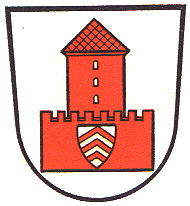Hainhausen: Difference between revisions
Jump to navigation
Jump to search
Knorrepoes (talk | contribs) No edit summary |
Knorrepoes (talk | contribs) |
||
| Line 17: | Line 17: | ||
====Origin/meaning==== | ====Origin/meaning==== | ||
The arms were granted in 1954 and show the castle of the Lords of Hainhausen. The castle is known since 1122, but the Lords of Hainhausen called themselves after 1185 Lords of [[ | The arms were granted in 1954 and show the castle of the Lords of Hainhausen. The castle is known since 1122, but the Lords of Hainhausen called themselves after 1185 Lords of [[Eppstein]]. The oldest known arms of Eppstein (which may also have been arms of the Lords of Hainhausen) are shown in front of the castle. The main colours are the colours of Mainz, as the village became in 1425 a possession of the Prince-Bishops of Mainz. | ||
[[Literature]] : Stadler, K. : Deutsche Wappen - Bundesrepublik Deutschland. Angelsachsen Verlag, 1964-1971, 8 volumes. | [[Literature]] : Stadler, K. : Deutsche Wappen - Bundesrepublik Deutschland. Angelsachsen Verlag, 1964-1971, 8 volumes. | ||
Revision as of 07:45, 26 August 2012
| Heraldry of the World Civic heraldry of Germany - Deutsche Wappen (Gemeindewappen/Kreiswappen) |
HAINHAUSEN
State : Hessen
District (Kreis) : Offenbach (until 1973 Hanau)
Incorporated into : 1977 Rodgau
Official blazon
Origin/meaning
The arms were granted in 1954 and show the castle of the Lords of Hainhausen. The castle is known since 1122, but the Lords of Hainhausen called themselves after 1185 Lords of Eppstein. The oldest known arms of Eppstein (which may also have been arms of the Lords of Hainhausen) are shown in front of the castle. The main colours are the colours of Mainz, as the village became in 1425 a possession of the Prince-Bishops of Mainz.
Literature : Stadler, K. : Deutsche Wappen - Bundesrepublik Deutschland. Angelsachsen Verlag, 1964-1971, 8 volumes.

